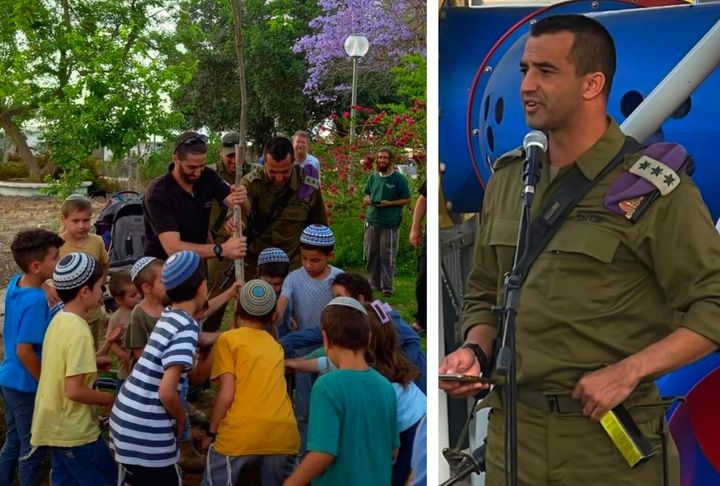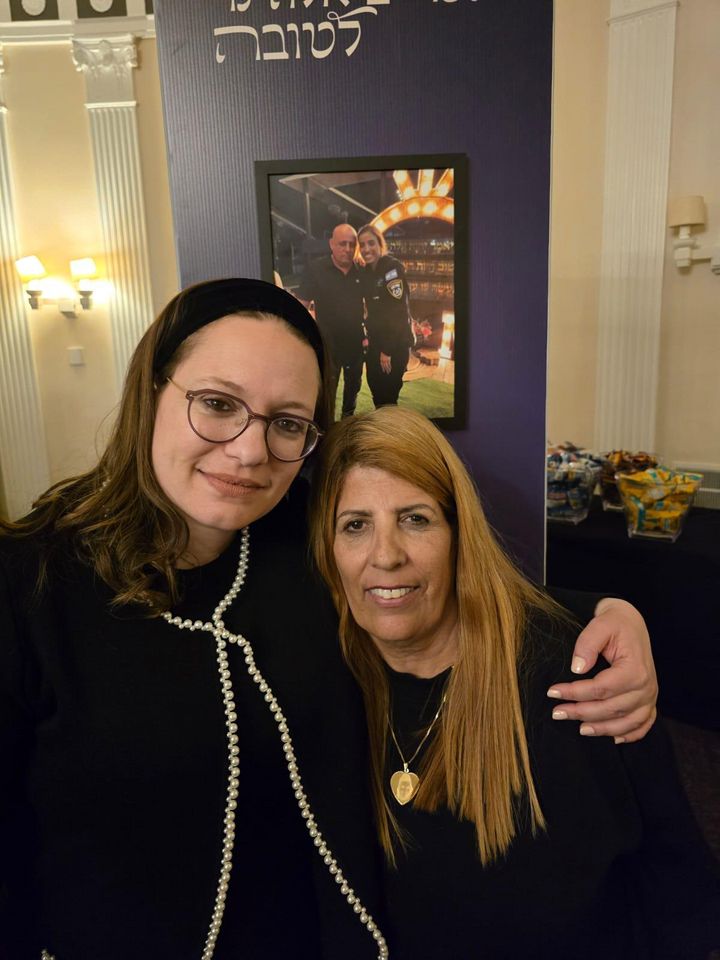

Posted on 11/17/25
In the photo (below) with me is Ayala Shkuri. Visible in the photo behind us are her daughter, police officer Mor Shkuri, who was murdered at the Sderot police station on October 7th, and Ayala’s husband, policeman Roni Shkuri, who was murdered in a terror attack less than a year later.
Ayala, both a bereaved mother and a widow, was one of the participants in the special trip to the United States organized by Menucha V’Yeshuah and led by Mendy Kenig. Fifty-three bereaved families from Israel received deep warmth, comfort, and tremendous appreciation from the US Jewish community.
On Shabbat, Ayala addressed the audience:
“People ask me how I am. How I’m doing. They ask how I managed to return to living alone in our home in Sderot. And I answer: ‘I’m not alone. I always knew that God was with me. And now I have two representatives of mine with Him: Mor and Roni. Their physical bodies are no longer here, but their souls exist forever. I feel them.’
“I was privileged to live with two people who wanted only to do good. I’m grateful for that privilege, and I also think about how to continue what they embodied. Both were great souls. Mor would recite Mizmor L’Todah every single day, so how can I not say it too? Mor excelled in honoring her parents; I ask young people to carry that forward.
“The night before she was murdered, our Mor encountered a slightly drunk and confused teenage girl who wanted to go to the Nova music festival. Mor stopped her from going and brought her home. That evening she said: ‘I already did my good deed for today.’ That’s just one small example of how caring she was.
“Roni was pure soul. People ask me what I miss most, and I tell them: ‘Honestly, I just want him to be sitting on the couch again, doing nothing.’
My message to people is this: Appreciate your loved ones while they are with you. Find joy simply in their presence, in the fact of your relationship, in their very existence.
“My answer to this double loss is one thing: do, do, do—and then do some more. Choose life. Hold on to routine. Act. Work. Wake up each morning and take on the day’s tasks.”
I told Ayala that she reminds me of what we read in the parashah of Chayei Sarah. Avraham Avinu concludes his mourning for Sarah, “to eulogize Sarah and to weep for her.” But the very next word in the Torah after his crying is: “vayakam, and he rose.”
To weep and to mourn, and then … to rise.
From Destruction Comes New Life
Lt. Col. Asaf Hamami, who fell in battle on Simchat Torah and whose body was held for over two years in Gaza, was recently brought to burial, finally bringing closure to his family.
Geula Rabi of Kibbutz Kerem Shalom sent me pictures of him visiting the kibbutz. In those terrible days of the “conception,” the misguided belief that Hamas was deterred, the residents of Kerem Shalom lived under the constant threat of sirens, with rocket fire an almost daily occurrence.
Part of their coping mechanism was through a moving communal ritual they called “planting in place of falling.” Whenever a missile barrage led to a rocket exploding in the kibbutz and creating a crater, they’d invite the community to plant a tree inside that very hole.
If the enemy already dug the pit for us, they explained, why not use it for planting? If there is already a hole in the earth, let something good, green, and fresh grow from it, something that wasn’t here before.
During one such ceremony, Hamami appears emotional, planting a tree together with the children of the kibbutz, and thanking them for inviting him.
“Many holes were dug here,” they told me this week at the kibbutz, which is now absorbing new families. “There are many gaps to fill. So much is missing.”
But the image of Hamami planting a sapling inside the crater gave them hope this week. That, they said, is his legacy: to grow from hardship.
The New Month of Kislev
As we welcome Rosh Chodesh Kislev on Friday, do you remember what we learned in kindergarten about this month and about the upcoming holiday of Chanukah? Everything we learned still holds true today:
• Kislev is a month in which the light defeated the darkness.
• It is a month that commemorates the struggle between the forces of good and evil. The side that ultimately emerges victorious is not the stronger one, but the one that represents the truth. All our enemies will eventually find themselves in the trash can of history.
• Kislev is a month of military strength as well as spiritual strength.
• Sometimes we need to maintain our courage over an extended period, and it may be difficult to keep up the momentum. Kislev reminds us that we can continually increase our strength. Just like the Chanukah candles, we add another candle each day, and each day has its own light. Similarly, if we manage to carry on our daily routine during these challenging days, each day is its own success.
• Finally, this is a month of miracles, prayers, and salvation. History has shown us that anything can happen, and we may be surprised by something good we never anticipated. A small jar of oil provided enough light for eight days, and in the end, the light was greater than we could have imagined.
Three Important Reminders from Parashat Toldot
1. What is your goal in life, to destroy others or to build yourself? The parashah relates how the Plishtim are constantly blocking Yitzchak’s wells and harassing him. It's strange, as these are their own water sources as well. But, as we’ve seen throughout history, our enemies want to harm us so much that they are even willing to harm and destroy themselves.
2. Yitzchak and Rivka pray for twenty years before they are blessed with children. Prayer transforms reality for the better. We must act in this world, but we must also pray. Let us add our prayers today for the safety and welfare of the Jewish people wherever they may be, in Israel and all over the world.
3. Good will triumph. The wonderful promises that Yitzchak hears in this week's parashah are being fulfilled in our generation, and God willing they will be fully realized very soon: "And I will multiply your offspring like the stars of the sky, and I will give to your offspring all these lands, and all the nations of the earth will be blessed through your offspring."

Lt. Col. Asaf Hamami, who fell in battle on Simchat Torah and whose body was held for over two years in Gaza, was recently brought to burial, finally bringing closure to his famil

In the photo with me is Ayala Shkuri. Visible in the photo behind us are her daughter, police officer Mor Shkuri, who was murdered at the Sderot police station on October 7th, and Ayala’s husband, policeman Roni Shkuri, who was murdered in a terror attack less than a year later.